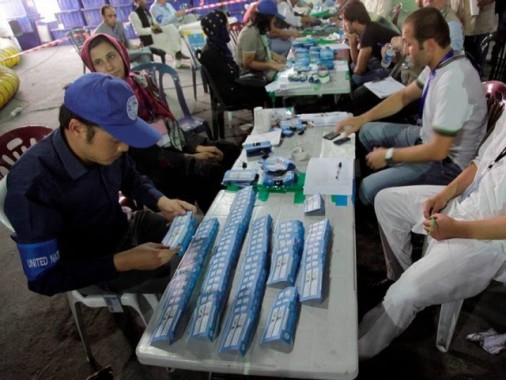
KABUL: Afghanistan’s 10-week election crisis entered a risky new stage on Monday when officials started invalidating fraudulent votes in a process likely to bring to a head the bitter dispute between the presidential candidates.
The country has been in paralysis since the June 14 election to choose the successor to President Hamid Karzai, who will step down as US-led NATO troops prepare to end their 13-year war against Taliban insurgents.
Karzai has insisted that the delayed inauguration ceremony must be held on September 2, imposing a tough deadline that has raised tensions between supporters of poll rivals Ashraf Ghani and Abdullah Abdullah.
The June vote was quickly mired in allegations of massive fraud, with Abdullah claiming that he had been denied victory after Ghani was declared ahead on preliminary results.
A smooth transition of power was meant to be the democratic keystone of the multi-billion dollar military and civilian aid effort in Afghanistan, but the impasse has emboldened the Afghan Taliban and weakened the fragile economy.
The anti-fraud audit of all eight million votes was agreed by both candidates as part of a US-brokered deal to calm tempers as fears rose of a return to the ethnic hatreds of the 1990s civil war.
“The IEC today begins the inspections of the audit result in an open session in the presence of national and international observers,” Abdul Rehman Hotaki, deputy chairman of the Independent Election Commission, told reporters.
He said the audit, which has not yet been completed, was a “huge logistical task” but would be transparent to ensure legitimacy of the final result.
Ghani and Abdullah have also pledged to form a national unity government whoever wins the election, though the details of the power-sharing system have been subject to disagreement between the campaigns.
The US has been pushing for the next president to be inaugurated before a NATO summit starting on September 4, which should sign off on follow-up support after the coalition’s combat mission in Afghanistan ends this year.
The political crisis would worsen sharply if either candidate pulls out of the audit or rejects its outcome, with possible street protests in Kabul by aggrieved supporters posing a major challenge to the national security forces.
On Monday, 3,644 of the 23,000 ballot boxes were put through the invalidation process. Only 74 boxes were thrown out, with 697 selected for a further recount.
“It is still premature to draw conclusions about the final audit result based on these initial findings,” UN mission chief Jan Kubis said in a statement.
“All parties should continue to respect the process so as to not create unrealistic expectations.”
The UN earlier warned that “speculation about any unconstitutional alternatives or appeals for civil disobedience can only worsen the current complicated situation”.
A reporter from the New York Times was expelled from the country on Thursday after he wrote an article saying government ministers and officials were threatening to seize power to end the standoff.
The article said a plan was being formed to create a committee-run “interim government” — a move that would threaten the country’s democratic future.
Unrest has worsened nationwide in recent months, with major Taliban offensives in the southern province of Kandahar and in Logar province, south of the capital.
Any backlash against the final election result could split the country, since many of Ghani’s supporters are Pashtuns in the south and east, while Abdullah’s loyalists are Tajiks and other northern groups.
Karzai, who has ruled since the Taliban regime was ousted in 2001, has stayed publicly neutral in the election, though Abdullah has accused him of being involved in the alleged fraud.








